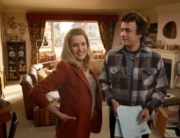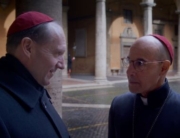
“Love is the best medicine in the world,” says a sweet child in the arms of her father.” “You’re a very melodramatic little person,” replies Papa as he bestows a protective kiss on her forehead. We then wait for the little girl to erupt in melodrama, but she never does. Since When Hitler Stole Pink Rabbit is about a German Jewish family presciently fleeing the Nazis, we also wait for drama—it doesn’t arrive either. Handsomely composed and seemingly shot in an eternal golden hour, co-writer/director Caroline Link provides a child’s view of a world catastrophe that never seems to ruffle domestic tranquility in any significant way.
Nine-year-old Anna (Riva Krymalowski, who evokes Natalie Portman in her childhood years) lives with her parents and her older brother Max (Marinus Hohmann) in a rambling, well-appointed house in 1933 bourgeois Berlin. On the eve of national elections, in which the Nazi Party is expected to gain significant support, the children’s journalist father (Oliver Masucci)—and Hitler opponent—has to suddenly leave for Prague, after which the family decamps to meet him in Switzerland. The children accept that they have to flee their comfortable home, bearing little more than the clothes on their backs, with nary a tear or expression of shock. (The title comes from a toy Anna can’t bring with her).
One looks for foreshadows of disaster and comes away thinking this family is pretty darn lucky in the face of Nazi pursuit. A grandmotherly family retainer does not spill the beans on the family’s departure, the details of which the mother (Carla Juri) indiscreetly and unwisely shares. A nosy neighbor looks over the fence but doesn’t tip off authorities either, and about the most sinister thing a border guard does is raise his eyebrows. So far, the ordeal has been, at the most, mildly stressful.
The family settles in clean, picturesque, and beautifully shot Switzerland, where the children adjust to school and enjoy a birthday party or two. Then it’s off to a prosperous-looking, relaxed Paris, where matters grow more dire. Money runs short, a grumpy landlady inquires whether the children are Jewish, and sad news arrives that a faraway relative has died. We wait for crisis, emergency, threats. But when the knock on the door comes under cover of night, it’s to… collect back rent. Soon the family’s off to London, gracefully riding on a boat against an immaculate sky to the next adventure.
The film is based on the 1971 semi-autobiographical novel by Judith Kerr, which emphasizes the positive in a family’s sticking together through turbulent times. Indeed, it is commendable and heartwarming to make a film about solidarity in the face of looming disaster, and perhaps thoughtful and unusual—the road less traveled by. Here, though, it’s just not very exciting.






Leave A Comment